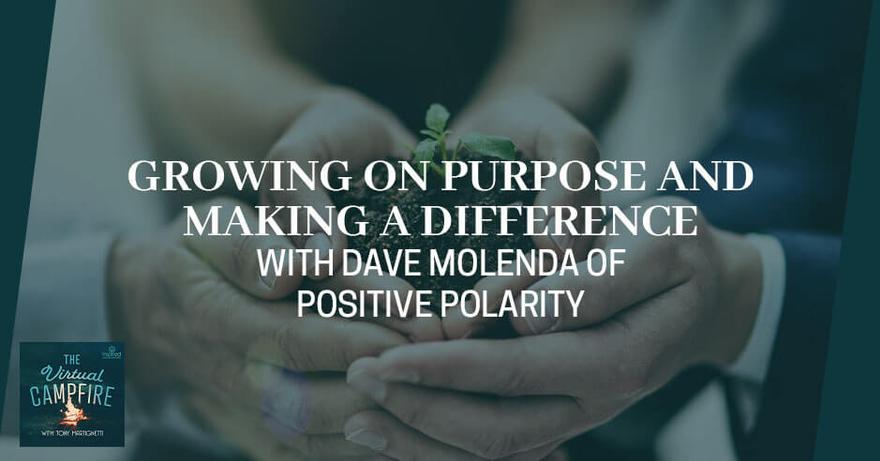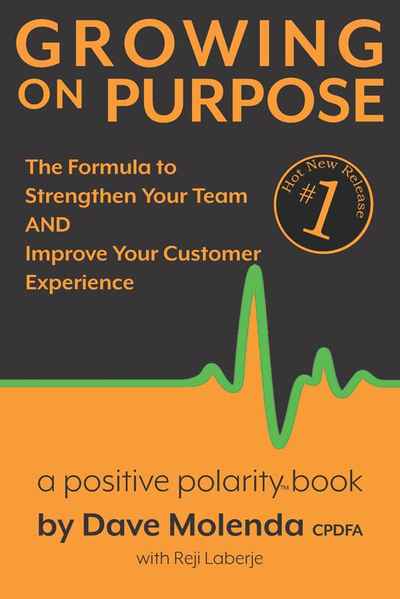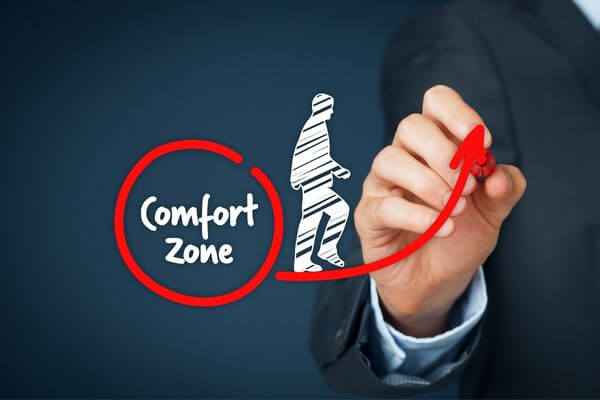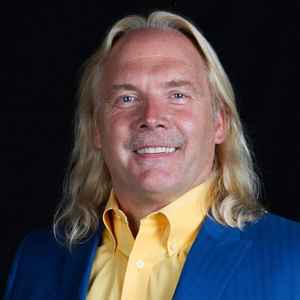Growing On Purpose And Making A Difference With Dave Molenda Of Positive Polarity

Is it your passion to make an impact in the world? For Dave Molenda, the founder of Positive Polarity, it started when he collected newspapers for recycling and exchanged them for money. While he was growing up, he capitalized on every opportunity that came his way to help people grow. He founded Positive Polarity to pass the principles of his success onto his clients through his coaching, training, and mentoring so that they too can succeed and grow. It’s your time to achieve your goals and grow as a person and business. Listen in!
---
Listen to the podcast here
Growing On Purpose And Making A Difference With Dave Molenda Of Positive Polarity
It is my honor to introduce you to my guest, Dave Molenda. Dave is the Founder of Positive Polarity, a Midwest-based coaching training firm that brings solid growth to companies from over 30 years of real-world experience, where he grew his business to $10 million in annual sales before selling it. He regularly speaks at conferences around the country on topics designed to make listeners not only hear but also engage, which is important.
He developed a formula for success, strengthening the team plus improving customer experience equals profit. With this formula, he has helped companies with their business to grow. His number one Amazon bestselling book called Growing on Purpose details the importance of both team and the customer and how, if treated properly, profit will follow.
He also is the host of the Positive Polarity Podcast, a weekly podcast that introduces awesome business professionals with amazing stories. He is a dynamic speaker that will truly reach the listener and move them forward. He lives in Wisconsin and also has a house in San Diego. He has four grandboys, so he is busy spending time with his grandchildren. It is truly an honor and a pleasure to have you join me on the show, Dave.
Thank you. I'm honored to be here as well, Tony.
 I love the intro because there are so many things about what you bring into the world. First of all, you can bring positivity into the world but also make an impact and drive that profit that a lot of businesses are all driven by. We can do good things but also make an impact, which is important.
I love the intro because there are so many things about what you bring into the world. First of all, you can bring positivity into the world but also make an impact and drive that profit that a lot of businesses are all driven by. We can do good things but also make an impact, which is important.
I'm honored to hang out and talk at the campfire. I'm looking forward to it. I didn't bring any s'mores or anything, so we'll have to wing it.
I'm thrilled to have you on. We're going to help you share your story to reach the audience and help people understand your journey to getting to where you are now. We do that through what's called flashpoints. Flashpoints are these moments in your journey that have ignited your gifts into the world. In a moment, I'm going to turn it over to you. You can start whatever feels most important to you. As you're sharing your story, we'll pause along the way and see what's showing up. With that, Dave, take it away.
It's interesting on my podcast that I was honored to have you on as a guest as well. We talk to a lot of entrepreneurs and business owners. It's hard for me to define entrepreneurship and what that means. I simplified it to where I'm trying to make a difference. It's weird. You want to do just something. It brings me all the way back to when I was a kid. When the paper was worth something, we would collect papers. I don't know if you did that.
We would go door to door in the neighborhood. I was probably seven years old back when it was safe to do so. You would go door to door and ask anybody if they had extra paper. A lot of people collected the newspapers back then for whatever reason. We would take it to the recycling place, and they would turn it into money. I don't advise you to do this, but one thing we learned was if you step on the scale as a kid, you get to have more money. The paper seems heavier because you're on the scale.
Sales is a step towards entrepreneurship.
I may or may not have done that a time or two, but I go all the way back to that spot where there was something that was driving me to be in that space. Whatever that looked like, trying to create something out of nothing, whatever that was. It started at that age, and it never left. That works for some people, and for some people, that doesn't. I'm not here to say that's the right or wrong way to do it. I'm just here to say that's how it started for me. There was always that desire to make an impact, whether it was a dollar here or a dollar there. As I grew and matured, the impact grew with you. That's where it started for me.
What roles did your parents play? Were they entrepreneurs as well?
They weren't. That's the unique part. I always say I was an only child like I was, and I'm not anymore. I am an only child. My dad was an engineer, and my mom was in the psychology world. I had no role model for business ownership. I had no role model on the entrepreneur side. It just was there. If you're reading and there's something that stirs within you on a consistent basis to try something on your own, I would encourage you to jump outside of your comfort zone and give it a try, whatever that looks like.
You don't have to quit your job and start a new company. To me, that's how I did it. On our show, we always talk to people about that journey. Some people's journey is a long 3, 5, 10, 20-year process, and some are 3, 5, 10, or 20-minute process. There's no right or wrong to it. If you're reading and something sparks when you read this, I would encourage you to at least dig a little deeper and see what that's all about. There are usually some real positive things that happen out of that.
I like that insight around the little sparks because sometimes we see them, but we don't act on them. Sometimes in our upbringing, too, we look at the role models and the people around us and say, "This is the path I need to follow because this is what the people around me do. I need to be following this example." Based on what you saw around you, how did you set your path for being an entrepreneur? I'm sure you were shaped by a lot of influences around you.

Positive Polarity: There was always that desire just to make an impact. As you grow and mature, the impact grows with you.
It is interesting because once I saw that work done, you graduate to putting a movie screen up and then charging the local kids. That's all the stuff. You start figuring these things out. In high school, I did my career paper, back when you did career papers. I did it on forest management. It was interesting because by the time I would have graduated college in '86, the starting pay was around $6,500 a year, which was crazy. It wouldn't even cover my expenses for paying my student loans back. I realized early on that it wasn't for me to be that way.
I jumped into the sales role because sales is a step towards entrepreneurship. It felt like there was freedom and untapped potential there. Sales were a stepping stone. I love to talk. You couple all those things together, and all of a sudden, the outcome is, "Have you ever thought about owning a business?" type of thought. That probably started in my early twenties because I was seeing people around me that were doing it. As you get exposed to that, there is a bunch of glamour around it.
You fall into the trap of thinking, "I can set my own hours. I can do what I want when I want." You find out that it is the exact opposite. In fact, your customers and your team generally set your hours, and you become dialed into those two camps. If people are reading and this is resonating, that's why people like you and I are here to help come alongside people on that journey, experience it together, and see if it is something that is a long-term opportunity.
What is the struggle? It's not all glamorous. "I get to set my own hours. I get to do my own thing." It's not that. There are some upsides and downsides. If you're willing to go on the journey and take the rollercoaster, it can be a beautiful ride, but you also have to understand the peaks and valleys along that journey. Tell me more about the journey. What are some things that you experienced along your way, especially as you moved from being in the sales period of your experience to company creation? What were the things that you learned about yourself along that path?
I work with a lot of people that think they have a great idea for a business. They think that if they get a website and a phone number, you open up your door, and all of a sudden, there's a line of people waiting out there. I learned early on that hard work was finding people interested in working with you. The hard work is in getting your message out. I do a ton of work with DISC and personality profiles. If I look at mine, it says that Dave gets bored easily. I'm like, "Thanks for sharing that with me." It made me come to terms with the fact that I have to work at something. I know people that make 50 or 100 phone calls a day to try and drum a business for their career. That was never me. I struggled with it.
It’s okay to struggle a little bit understanding your strengths.
I took it back in the '80s and '90s. I took the route of meeting people and trying to find something that I could help them with rather than walking and saying, "Can you buy something from me?" It was easier for me to learn the opposite route of, "How can I help you?" I figured that if you got help from me, eventually, that would come back in my favor. That's what I learned early on. Get connected with people and find ways to help them rather than looking around for people who can help you. That was a big piece of my life.
I love that insight. A business is built one conversation at a time. If you are good with relationship-building and enter business-building that way, that is your road to success. If you're someone who doesn't enjoy that, you've got to partner up with some people who do get that.
That's a good point. Early on, I struggled a little bit in understanding my strengths. I did StrengthsFinder. I did DISC. I did use these tools, but I didn't have somebody come alongside me and help me. You can take a free assessment online for DISC and get these 3 or 4 pages. You look at them and struggle to apply that to your life. Our assessments are 40 to 50 pages. People usually come for a session or two to understand, "What can I do with this?"
There's nothing worse in my life than looking at the remote for my TV. There are 100 buttons on there, and I know what 3 of them do. On/off is one. Volume is the second. The channel is the third. The fourth is the record. Outside of that, I don't know anything. It would be great to have somebody come alongside me and say, "Did you know that this button does this?"
That's what early entrepreneurs struggle with, asking for help. If that's you on the show, I will find a coach, a mentor, an accountability group, or somebody that's going to be able to help you with your blind spots. We have so many blind spots as early entrepreneurs. We don't know what we don't know. That's why people like us are out there to help those types of people along.

Positive Polarity: If you're listening and there's something that stirs within you on a consistent basis to try something on your own, jump outside of your comfort zone and give it a try, whatever that looks like.
That awareness is a starting point. Having that awareness is the doorway to being able to take the right actions that will bring you to the right next steps. That's a great insight. I like the analogy of the remote control because it's a great tool, but the right tool in the hands of somebody who doesn't know how to use it is not very useful.
It's frustrating to have this and not understand what it does. Why buy something that you don't understand? If you don't know how to use a hammer, that's what YouTube's for. It's for simple things like that. Tiger Woods and Michael Jordan were probably two of the best athletes that were ever alive. Michael Jordan and Tiger Woods were surrounded by coaches. Tiger couldn't see his swing. He had somebody look and say, "You got a glitch right there. You're doing that."
As business owners, why do we think that we don't need that same attention to our business? We have our CPA. We have our attorney. There are certain chunks of our business that we allow others to watch. Whether it's building your team or improving your customer's experience, whatever it is, we need help at times. That's why people like you and I are out here, to help people like that.
I would love to jump back into your story for a moment. What was the next flashpoint as you got further along in growing your business? What were there moments that had you questioning, "Am I on the right path? What is the next thing I need to solve for myself so that I can make a bigger impact?"
One of the businesses that I owned was reliant on housing starts. Here in Milwaukee, in 2008, the housing starts decreased by 80% to 90%. Imagine you cruising along. Life is good. Everything's going well. I had seventeen people on my team. All of a sudden, 2008 comes, and we have a decision to make. Imagine if you had 1 customer that was 80% of your business, and that customer left. You're stuck with this decision of, "What in the world do we do?"
Keep your customers in business.
My thought was if I could keep my customer in business, they would keep me in business. In 2008, I started to do regular training for our customers. They were everything but products. They were LinkedIn training. They were QuickBooks training. They were marketing training. I would train on whatever I could. I would bring in experts that were interested. In 2008, everybody was interested in something. It was easy to create this synergy.
All of a sudden, we started to get a following of people. The QuickBooks person would come, and then 15 or 20 of my clients would be in the room, and they would be like the same thing as with the remote control, "I don't know what this button does for QuickBooks. I don't know how this works." We started to educate them on non-product things. They had things that had nothing to do with my company, but I became known as the person looking to help them stay in business.
The cool part was when everything opened back up, we became known as that knowledge source. The nice part was that it worked along the way too. From 2008 to 2012, when it started to open back up, our business grew by 47%. A lot of other people were holding, turning down everything, starting to shut things down, and spickets were turning off. There was a lot of pushing down. We were opening up. We were trying to provide as much value as we could. When a lot of other people went down 47%, we went up 47%. That's the cool part of it.
A lot of it was why I wrote my book called Growing on Purpose. There were a ton of people that I ran into that grew by mistake. They grew, but they didn't know how they did it. If you ask them, "Could you repeat this?" they wouldn't know how to repeat that process. That's why I created the Growing on Purpose. The title was because I wanted to help people grow on purpose and be intentional about that growth. That whole thing came from watching 2008 to 2011. I'll call it that intentional growth that our company had. It springboards from there. It took off after that.
I love the story you shared because it's a perfect example of a flashpoint. You start an opportunity to look maybe upstream and say, "Where's the real problem causing this downturn? What is a thing that people need at this moment?" As you look upstream, you see an opportunity. Most people say, "Maybe that's opportunistic." It seems sinister to say opportunistic, but it served people in a way that helped them grow. It helped to get people out of that funk. The positive nature of that helped you and them. By helping them, you helped yourself, which is great.

Positive Polarity: Get connected with people and find ways to help them rather than looking around for people that can help you.
It goes all the way back to being a kid where you could say it's opportunistic because I asked for the papers from my neighbor. Rather than them driving to the recycle place, my dad drove me to the recycle place, and we got money for it. Anywhere you look, it's opportunistic. It's just in how you look at it. My goal specifically was to keep my customers in business. The construction industry had not experienced that type of downturn, so everybody struck.
They didn't know how to market. They didn't know how to sell. They didn't know how to do the ancillary things in their business. They knew how to build stuff. Most of them were great at building. The architects were great at drawing. Talk about other things in the softer skills of business, "How do I market myself? How do I sell myself?" They had no clue. We were a beacon of light that attracted people. We were filling up our groups. We started doing them every other week. We were having groups of people come through and networking opportunities.
When an architect's sitting next to a builder and the architect is like, "I got a plan that I need you to look at, somebody wants to build a house," the builder is like, "That's great. I have a customer that needs an architect." There was a synergy there. You start thinking about it from a bigger perspective. It's not just me. It's them. It grew from there. Quite frankly, I fell in love with that so much. I sold in 2012 because I wanted to do this full-time. I wanted to train, teach, and mentor full-time. That's how Positive Polarity was born.
There's something about what you're tapping into here. At the core, there are three things that an entrepreneur creates which are opportunities, possibilities, and connections. When you can tap into all three of those things, maybe there's a nice POC. It's a nice acronym. You embodied all of that in what you did. You're able to connect with these people, create new possibilities through what you did, and tap into seeing the opportunities and capitalizing on them in a positive way which is a great thing.
Coming alongside somebody that doesn't understand that is hard to do. First, you have to speak their language. That's the thing we talk about a lot with DISC. Everybody has a different personality. They all have different ways of communicating. Imagine how successful this show would have been if I would have started speaking in a language that you didn't understand. How long would we have been able to talk back and forth with each other if we didn't understand each other?
Different people communicate differently.
That's how we do in communication a lot. That's where we, as entrepreneurs, tend to be going so fast. We are dialed into results that we forget along the way that there are these people who are either customers or our team. A big flash point for me was when I realized that I couldn't continue to speak the way I speak. I have to modify the delivery of my message to different people. That was a huge thing.
If you're reading and used to having everybody around you acclimate to your way because you're the boss or the leader, the chances are good that you struggle with keeping engaged employees. Retention's a problem. Acquiring people is probably a problem. One of those things that were a huge flashpoint for me is understanding that different people communicate differently. When I was able to grasp that, that's when business exploded. People wanted to show up at work. People wanted to work. They wanted to be engaged. They were tickled pink to be in a place where they felt genuinely cared for.
You made me think of this idea of the golden rule versus the platinum rule. The golden rule is, "Treat others the way you want to be treated or communicate to others the way you want to be communicated." A lot of people think that is being good to other people. What is the platinum rule?
To me, the platinum rule is to communicate to other people the way that they want to be communicated with. That's 100% accurate. It's so funny because I do training on this exact thing. The title is When the Golden Rule Doesn't Work. You get people turned off by that at first. I have to put in the subtitle something about communication. It's not the biblical principle that I'm arguing. It's the fact that if we communicate the way we want to be communicated with, there's going to be a shortcoming in our communication. In this world, if we're not overcommunicating, we're not even doing justice to that.
In preparation for this, for you, I probably got 3 or 4 emails. I got a text. I got all these communications from you. It's way better than the opposite of standing up for something and then hearing crickets and like, "Are we still doing this?" That's the testimony right there of the importance of overcommunicating. The best part about most of what I talk about is that all these things are free. It doesn't cost you money to overcommunicate. It doesn't cost you money to understand somebody how to communicate with them in their style. That's what is powerful about all this.

Positive Polarity: Whether it's building your team or improving your customer's experience, we need help at times.
I love that you say that because it's true. People think like, "What is it going to take for me to be like that?" It takes time. Time is not free, but if you want any relationship to work, if you want to lead in a better way, you have to have a desire to put in the effort.
You could argue that you'll save time upfront. At the end of the day, if you are constantly recruiting, trying to develop, and retain people, you're burning way more energy and dollars on the back end than if you did it right the first time. To me, that is so critical. It seems like everybody says, "Do it right the first time," but in reality, don't follow that all the time.
I have a strange question to ask you. It's coming to my mind. I want to know what positive polarity means to you. It's the name of your podcast. Maybe you could share why positive polarity is the name.
It was 2012. I was working with a marketing firm. I was trading some DISC assessments for them to help me start my company. There may have been either Coronas or margaritas involved. We started to talk about this. I wanted the word positive in my company name because I feel there's so much negativity that was going on back then. Now it feels probably even worse. Most people gravitate to positive people. We try and get away from negative people. That's how that came about.
The polarity part is where there's an opposing way of doing something. That's what I look at from the polarity perspective. I help my clients. In general, I help people through and look at something from a different perspective, "Let's look at this in a different way. Let's look at this as a different way of doing things." The positive and negative on a magnet attract each other. Positive to positive, they repel. They don't want to touch each other.
The Bible is by far the most powerful book.
I'm looking at this. It's right on the front of my website. It's the opposing way of doing something. I challenge people. The worst words to me are, "That's just how we do it around here." When I hear that from companies, I think back to, "What do you think the boardroom looked like for Blockbuster?" All these suits are in the room, and this little company called Netflix is starting to bite away at their profits. They have 10,000 stores. They're like, "This is going to be fine." They start seeing a decline.
Most companies would try and right that wrong. I don't know why but I'm guessing there are a bunch of people in that room that said, "This is the way we've always done it. This is the way we're going to keep doing it. We'll be fine." They have one store left somewhere on the West Coast. They didn't take to heart that they needed to have an opposing way of doing it.
I'll hear somebody say, "This is a family-owned business. My dad did it this way. Grandpa did it this way. Great-grandpa did it this way." I'm not saying it's right or wrong. There's no right or wrong here, good or bad. It's just that there's an opposite way of looking at things. What a business coach or a mentor is designed to do is to look at it from a different perspective. That's what positive polarity means to me.
A through-line in a lot of your journey is looking at, "What are people missing? What is a positive opportunity that we can pull out of this negative situation?" When I look at those stories you shared, it seems to resonate. Your name captures a lot of who you are.
It makes people think. Let's put it this way. Positive people live longer, make more money, and have more success in their life. I struggle. The reality of it is if you have that mindset and you're a positive person, there are always going to be speed bumps along the way. Generally speaking, you're looking for the positive of the situation, in a person, or a company. It's sad, as Gallup said, 2 out of 3 people show up for work, and they're not engaged.

Positive Polarity: Communicate to other people the way that they want to be communicated with. And that's a hundred percent accurate.
That's a dangerous thing. It's going to get worse as we continue to try and struggle along with remote working and things like that. Hopefully, it gets better, but it's one of those things that I need to help my clients find more engaged employees. Engaged employees drive growth like crazy. What we're all about is growth.
I'm riding alongside you. That's a great cause and way for us to think about this. I got one last question for you. The last question as one that I love to hear the insights on is, "What are two books that have an impact on you and why?"
I don't know what you're expecting or what you've heard. I'm sure you've heard them all. For me personally, the Bible is by far the most powerful book in my life. Specifically, if you look into the Book of Proverbs and how much wisdom King Solomon had about working and owning a business, it's crazy how much personal training is in that book.
Put it this way. When you see something like, "Don't talk a lot. Listen more than you talk," that's a biblical principle. It doesn't matter where it came from, necessarily. You look at these little gems in your life, and I've learned to be way more listening than talking. It's little things like that that were like, "Where did that come from?"
For me, that's the book that I personally and professionally enjoy. I would be lying if I didn't say Growing on Purpose. That would be the two books. If I had to pick another one, it would be something from Jon Gordon because he does fantastic books in their business fables. You learn from jumping into a story. I love reading stories that have principles through them that talk about business principles that you can learn. Those would be my two.

Positive Polarity: Positive people live longer, make more money, and have more success in their life.
The Bible is an interesting one because it's a book that's lasted the span of time. As much as some people are like, "It's hard to read, and sometimes it's hard to understand," at the end of the day, that's the source of a lot of the stories that then transcend into a lot of the other books.
You talked about the golden rule, "Do unto others as you would have them do unto you." Set it aside as a spiritual, biblical principle. That's a smart thing to do as a human being. Set aside where it came from. From a business perspective, that's wise as well. I'm sure there's an entrepreneur reading who's getting agitated because we're talking about treating your team and your customer better. There are still plenty of companies that don't treat their team very well. You can see the high turnover, the stress, and the anxiety, and it's like yuck.
We can all do better. If you're doing well, you can always do better. That's a secret to it. I'm grateful for what you've shared and your insights. This has been a great journey. Thank you so much for coming to the show.
Thank you for stoking the fire up. I'm excited to be sitting around a campfire with a s'more. Nothing beats that.
Before I let you go, I want to make sure that the guests know where they can find and learn more about you. What is the best spot?
Go to PositivePolarity.com. You'll find the information on the book, on me, and on my podcast that I put out every week. Linkedin is where I usually hang out from a social media perspective. In one of those two places, you'll probably find me helping somebody grow on purpose.
I truly appreciate it. Thank you to the readers for coming on the journey.
Important Links
- Positive Polarity
- Growing on Purpose
- Positive Polarity Podcast
- StrengthsFinder
- Jon Gordon
- Linkedin – Dave Molenda
About Dave Molenda
 The presence or manifestation of two opposite or contrasting principles or tendencies. In business, there are times we need a contrasting principle to help us see clearly, or get through some not so fun times. At Positive Polarity LLC, it's my job to help you navigate whatever waters you find yourself in...whether you need to strengthen your team, or improve your customers experience, I can use my 30 plus years of business knowledge to help as a business expert, problem solver, or a sales coach! Call me at 414 322 2358 or email me at dave@positivepolarity.com to see if there is something that I can help you with. The first consultation is always complimentary!
The presence or manifestation of two opposite or contrasting principles or tendencies. In business, there are times we need a contrasting principle to help us see clearly, or get through some not so fun times. At Positive Polarity LLC, it's my job to help you navigate whatever waters you find yourself in...whether you need to strengthen your team, or improve your customers experience, I can use my 30 plus years of business knowledge to help as a business expert, problem solver, or a sales coach! Call me at 414 322 2358 or email me at dave@positivepolarity.com to see if there is something that I can help you with. The first consultation is always complimentary!


0 comments
Leave a comment
Please log in or register to post a comment